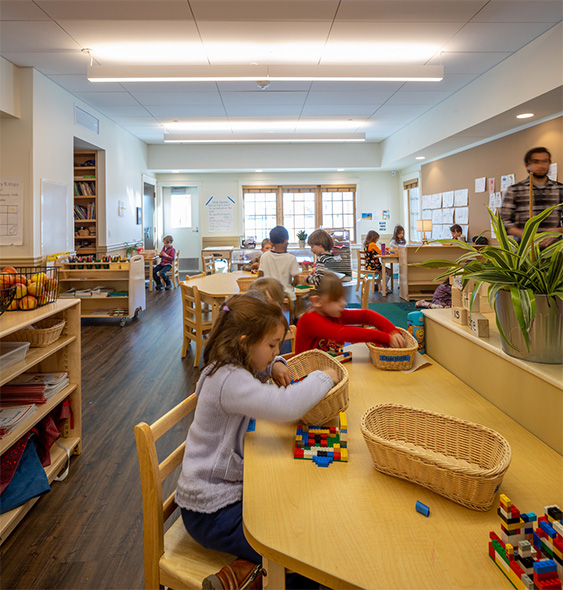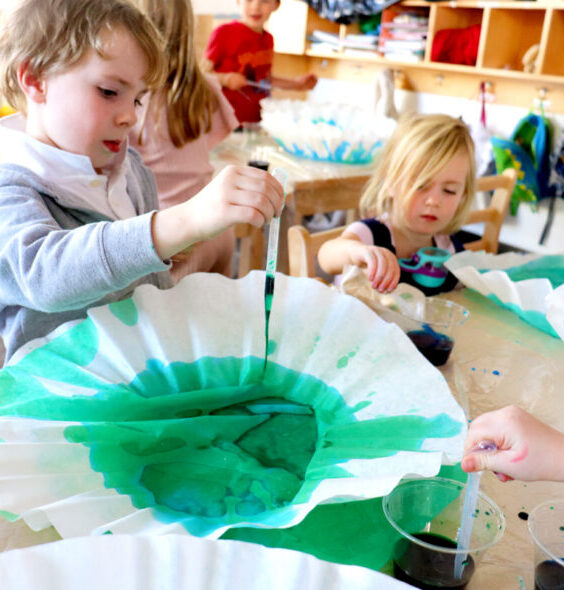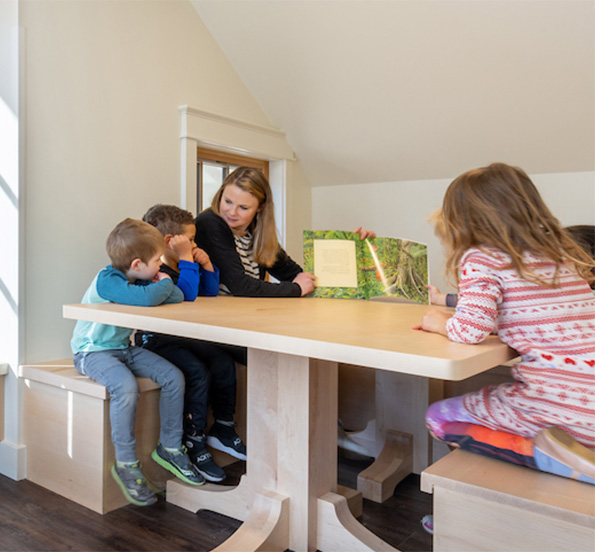Constructing the Compositive Curriculum
The emergent curriculum at Compositive Primary grows with the needs of every child. We strive to prepare students to be sophisticated thinkers who master content and have a sense of responsibility for their own learning and community. We empower students to think critically and creatively as they pursue answers to their own questions. Our personalized approach creates a learning environment that celebrates students’ interests, goals, and learning preferences throughout the inquiry process.
Read MoreThe curriculum at Compositive Primary is developed through the lens of four domains and four capacities. In an effort to educate the whole child, we place equal emphasis on the domains of cognition, character, health and well-being, and community engagement. Within those domains, we seek to nurture our students’ capacities to reflect and learn, recognize and act, care and connect, and engage and serve. In this way, we foster academic, personal, social, and emotional growth. Compositive Primary utilizes inquiry arcs to engage students in exciting challenges and discoveries. Each inquiry arc is animated by provocative, open-ended questions that are developed equally from students’ interests and educational standards.
Content areas are integrated into daily inquiry as students grapple with real world problems to solve. Our emphasis is on deep understanding and applying knowledge to new situations and problems. We know that when students are faced with relevant concepts and intriguing problems, they thoughtfully experiment, exhibit creativity, and problem solve. Students are challenged daily to experiment, take risks, make connections, and care about others. On a typical day, students might be observed participating in a small group numeracy provocation, working collaboratively with peers on an inquiry project, engaging with loose parts, writing a reflection on learning, and playing outdoors with friends and open-ended materials. We believe that children learn most deeply when their minds, hearts, and bodies are engaged simultaneously and when that engagement is focused on how they live in the larger world.

Inquiry
At Compositive Primary, we believe learning happens best when students construct their own understandings. With teacher support, students design their own learning within an inquiry arc which may include ways to solve math problems, creative writing pieces, engineering designs, informational research, and artistic expression.
At the end of the inquiry arc, students reflect on their learning and consider how to apply knowledge to their lives and to be changemakers in our world. This arc allows students to cultivate their own interests and develop a deep understanding of material, which remains with them over time.
By engaging in open-ended inquiry projects, students define problems, set goals, and learn time-management techniques in an atmosphere that celebrates questions and collaboration. An inquiry-based program addresses children's range of abilities by using differentiated projects and fostering open communication.
Each inquiry arc includes a celebration of learning — a chance for students to share their new understandings with classmates, parents, and community members. This may consist of theatrical performances, student-made documentaries, student-made books or displays, or actual physical creations that showcase the learning from a particular unit of study. These celebrations provide opportunities for learners to exhibit their work and share their learning with an authentic audience.
While we understand the importance of sharing and celebrating learning, we also challenge our students to engage their learning outside of their classrooms. Each inquiry arc culminates with students asking themselves how they can make a difference in the school community, the surrounding community, or the world at large. These larger projects encourage students from a young age to see themselves as changemakers who engage and serve their local and global communities.
To ensure quality work, ongoing documentation and reflection are essential to the learning process. Students and teachers collaborate by discussing specific artifacts (pieces of writing, images of work, transcripts of conversations, videos of collaborations, and more) and critiquing their work throughout the inquiry arc. This iterative process allows students to grow as thinkers and innovators, and it helps them develop skills such as the ability to research, synthesize information, collaborate, communicate their ideas and findings, and persevere through challenges.
We know that each student has their own learning and emotional needs, and we are prepared to continuously create inclusive learning environments that support children through rigorous instruction, engaging materials, exciting provocations, and a joyful community.

Individual Goals and Portfolios
Personalized learning is a key pillar of the Compositive Primary design, and it begins by understanding that each child holds extraordinary potential. Our approach to learning hinges on four capacities (reflect and learn, recognize and act, care and connect, engage and serve) and their development across four domains (cognition, character, community engagement, health and well-being).
With our small class sizes and focus on relationships, teachers work to understand each child’s strengths, interests, passions, and areas for growth in relationship with students’ families. Students, families, and teachers form a team that creates individual goals for each child for each inquiry arc. Students and teachers work together to track progress toward these goals through effervescent documentation and reflections that are curated and shared with families in digital portfolios, which are organized by the Compositive capacities and feature a growth mindset for each child.
Read More
Standards & Alignment
While learning and thinking are visible throughout our school and in documentation and portfolios online, we recognize that it is important to consider the ways in which our learning aligns with standards outside of our community. We are committed to each child’s academic excellence and measure it individually as well as in relationship with standards that are commonly accepted across the United States.
At the heart of our expectations are those essential to Common Core standards as well as Next Generation Science standards, the C3 Framework, Responsive Classroom, and Collaborative for Academic, Social, and Emotional Learning competencies. Each of these frameworks is closely aligned to the guidelines set forward by the Colorado Department of Education. We have supplemented these documents with our own rigorous understanding of children as they develop into our capacities and domains. Having identified these sources, we know that what students are learning is only a piece of the project. We are particularly excited to support how students are learning. That is the journey of inquiry that animates our teaching and learning every day.
Read MoreIntegrated Curriculum
Story & Literacy
Strong literacy skills are essential for student success in school and lifelong learning. The language arts curriculum is integrated through a story workshop model in all aspects of the curriculum. This learning happens explicitly through centers and provocations and reader’s and writer’s workshops as well as implicitly throughout challenges posed by specific inquiry arcs. Compositive Primary provides every student with a comprehensive literacy curriculum that incorporates skill building, regular reading and writing practice, listening and speaking, and opportunities for creative expression. Each student’s work is carefully tracked so that new and enticing literacy challenges can be provided for them throughout the school day.
Numeracy & Math
Numeracy, quantitative reasoning, abstract thinking, and problem solving are all central components of the mathematics workshop at Compositive Primary. At all grade levels, our math program provides a student-centered, hands-on environment in which students observe, explore, and discuss the meaning of mathematics in our world. During math workshop and throughout inquiry arcs, students participate in “low floor and high ceiling” math experiences that require critical thinking, problem-solving, and conceptual understanding. Compositive Primary teachers are committed to seeing all students as mathematicians who are able to engage fully with stimulating problems that have real-world implications.
Science & Engineering
Compositive Primary teachers reinforce scientific connections across inquiry arcs. Students develop a sense of wonder through their exploration of the scientific world as teachers guide emergent expert observers, question-askers, and hypothesis-makers. Students learn the processes of experimentation, including making predictions, recording and analyzing data, and forming conclusions through connections with real-world materials that offer complications and opportunities for divergent thinking.
Culture Investigations & Social Studies
Compositive Primary teachers prioritize and support students’ understanding of enduring concepts and big ideas so they can apply them to our ever-changing world. Students learn to read, write, and think as historians and social scientists throughout inquiry arcs. These roles help them develop deeper understandings of themselves and the world around them. In delving into the social sciences, students use critical thinking to differentiate fact from opinion and to understand cause and effect. They also use these investigations as opportunities for creating meaningful change in their local and global communities.
Arts & Play
Infused throughout our curriculum is a multimodal exploration of integrated arts and an abundant practice of play. We encourage children of all ages to investigate and learn through a variety of artistic practices. We celebrate play as a catalyst for social and emotional intelligence as well as an avenue for unstructured, child-led time with materials and peers. While play fuels the energy of our classrooms, the arts offer opportunities for inventive thinking and discrete skill-building. We use these sensibilities as we fill our classroom environments with new, natural materials and open-ended space for children to explore their agency as artists and collaborators. Our classrooms are complemented by rich outdoor spaces that invite children to engage with their health and wellbeing in the natural world.
Social & Emotional Learning
At Compositive Primary, we know that social and emotional skills are foundational. Central to our model is the belief that children deserve an education that addresses more than just their academic development. Research suggests that high quality SEL programs produce positive outcomes for students — our teachers integrate social and emotional development into all aspects of teaching and learning. In order to thrive, students need to feel a high level of connectedness to their classroom. Through regular morning meetings, individual and group conversations, and explicit instruction, our students build their capacities to care and connect with each other and their communities. Our teachers emphasize interpersonal skills, empathy building and perspective taking while modeling daily interactions with attention to developmentally appropriate guidelines. Compositive Primary’s instructional model revolves around an integrated inquiry approach. The success of this model depends on students’ ability to work together, to take responsibility for their learning, and to take risks within their community. Compositive Primary’s commitment to prioritizing SEL throughout the school culture provides the building blocks for students to gain the skills necessary to be strong communicators and thoughtful citizens.



